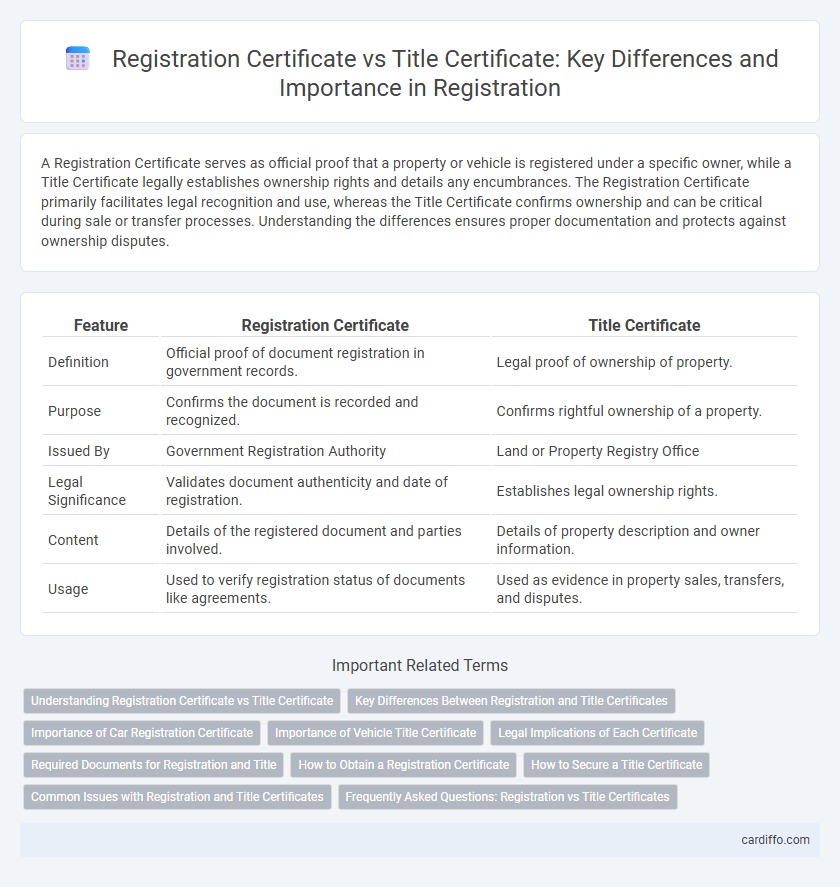A Registration Certificate serves as official proof that a property or vehicle is registered under a specific owner, while a Title Certificate legally establishes ownership rights and details any encumbrances. The Registration Certificate primarily facilitates legal recognition and use, whereas the Title Certificate confirms ownership and can be critical during sale or transfer processes. Understanding the differences ensures proper documentation and protects against ownership disputes.
Table of Comparison
| Feature | Registration Certificate | Title Certificate |
|---|---|---|
| Definition | Official proof of document registration in government records. | Legal proof of ownership of property. |
| Purpose | Confirms the document is recorded and recognized. | Confirms rightful ownership of a property. |
| Issued By | Government Registration Authority | Land or Property Registry Office |
| Legal Significance | Validates document authenticity and date of registration. | Establishes legal ownership rights. |
| Content | Details of the registered document and parties involved. | Details of property description and owner information. |
| Usage | Used to verify registration status of documents like agreements. | Used as evidence in property sales, transfers, and disputes. |
Understanding Registration Certificate vs Title Certificate
Registration Certificate and Title Certificate serve distinct purposes in property ownership documentation. The Registration Certificate officially records the transaction with the government, ensuring legal recognition and protection of ownership rights, while the Title Certificate proves actual ownership and may be used in property transfers or legal disputes. Understanding the difference ensures compliance with legal requirements and safeguards against fraudulent claims, crucial for property buyers and sellers.
Key Differences Between Registration and Title Certificates
A Registration Certificate serves as an official record confirming the registration of a property or vehicle with the relevant government authority, while a Title Certificate legally proves ownership rights. The Registration Certificate includes details such as registration number, date, and the registered owner's name, whereas the Title Certificate contains specifics about ownership history, liens, and encumbrances. Understanding these key differences is essential for verifying legal ownership versus mere registration status in property or vehicle transactions.
Importance of Car Registration Certificate
A Car Registration Certificate is a crucial official document that proves ownership and legality of a vehicle on the road, ensuring compliance with transportation laws. Unlike a Title Certificate that establishes ownership rights, the Registration Certificate is required for vehicle identification, tax payment, and renewal of registration. Possessing a valid registration certificate is essential for law enforcement verification and avoiding penalties during traffic stops.
Importance of Vehicle Title Certificate
A Vehicle Title Certificate serves as the primary legal proof of ownership, detailing critical information such as the vehicle identification number (VIN), make, model, and lienholder details, making it essential for buying, selling, or transferring a vehicle. Unlike a Registration Certificate, which confirms vehicle registration and roadworthiness, the Title Certificate establishes ownership rights and is necessary for securing loans or resolving disputes. Retaining the Title Certificate ensures clear ownership verification, facilitating smooth transactions and protecting against fraud.
Legal Implications of Each Certificate
Registration certificates provide proof of legal ownership and are essential for establishing the legitimacy of property transactions, ensuring the owner's rights are recognized by law. Title certificates represent the actual ownership rights, detailing encumbrances, liens, or disputes that could affect the property's legal status and marketability. Understanding the distinctions between these certificates is crucial for resolving legal conflicts and securing property interests.
Required Documents for Registration and Title
The Registration Certificate requires proof of identity, proof of address, sales invoice, and a valid insurance certificate, serving as official proof that a vehicle is registered with the transportation authority. The Title Certificate demands ownership documents such as the original bill of sale, previous title certificate if applicable, and a completed application form to legally establish ownership and transfer rights. Both certificates are essential, with the Registration Certificate validating the vehicle's legal use on public roads and the Title Certificate confirming ownership status.
How to Obtain a Registration Certificate
To obtain a Registration Certificate, applicants must submit a completed registration form along with proof of ownership, valid identification, and applicable fees to the local vehicle registration authority. The process typically involves a physical inspection of the vehicle and verification of submitted documents to ensure compliance with legal standards. Upon successful verification, the Registration Certificate is issued as proof of legal vehicle registration, distinct from the Title Certificate, which serves as proof of ownership.
How to Secure a Title Certificate
Securing a Title Certificate involves submitting an application to the relevant land registry or governmental authority, along with required identification and proof of ownership documents. The process typically includes paying registration fees and undergoing a verification step to confirm the property's legal status. Ensuring all documents are accurate and complete expedites the issuance of the Title Certificate, which legally evidences ownership rights.
Common Issues with Registration and Title Certificates
Registration Certificates and Title Certificates often encounter common issues such as discrepancies in owner information, incomplete signatures, and outdated property details that can delay legal processes. Errors in data entry or failure to update records after property transfer create challenges in verifying ownership and securing loans. Ensuring accuracy and timely updates in both certificates is crucial to avoid disputes and streamline property transactions.
Frequently Asked Questions: Registration vs Title Certificates
Registration certificates confirm the legal recording of property ownership with government authorities, ensuring official recognition and protection of ownership rights. Title certificates provide detailed proof of ownership history, including liens or encumbrances, enabling buyers and sellers to verify clear property titles. Understanding the distinctions helps clarify which document is necessary for property transactions, legal verification, or dispute resolution.
Registration Certificate vs Title Certificate Infographic

 cardiffo.com
cardiffo.com